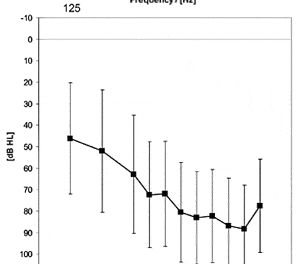By Shari Eberts
Would including real-world experiences of people with hearing loss in audiology student classrooms increase empathy for and understanding of the lived hearing loss experience? Would it motivate students to prioritize person-centered care? Could it be the missing link in creating more effective hearing care for people with hearing loss?
Kathy Cienkowski, PhD, program director of Audiology at the University of Connecticut, and I decided to find out. We are both passionate believers in including lived experience in audiology education, so when we met at the 2022 ASHA Convention, we hit it off immediately.
After the conference, we decided to embark on an experiment. In an upcoming class, Dr Cienkowski would include Hear & Beyond: Live Skillfully with Hearing Loss (the book I co-authored with Gael Hannan) as well as other community-engaged learning opportunities as part of the course curriculum, and we would then analyze and report on the impact. What did the students learn? How easy or hard was it to implement? How could others do this in their classroom?
Spoiler alert: Including community-engaged learning worked incredibly well.
Why Community-Engaged Learning is So Critical
An audiologist is often the first hearing care provider a person with hearing loss will see. The impact that the first appointment can have on a new patient’s hearing loss journey cannot be overstated. I know it certainly was very important for me.
Most of us walk into our first hearing care appointment scared and bogged down with stigma. When an audiologist greets us with empathy and real-world understanding, our care is, in a word, better. It is more person-centered because it goes beyond the hearing aid to include counseling on mental attitude, peer support, and communication best practices. All these elements are necessary to live well with hearing loss.
This is why community-engaged learning is so critical. It lays the foundation for person-centered care. The more empathy and understanding students develop in training, the better equipped they will be to build strong patient-provider bonds. Better hearing outcomes are the result.
What is Community-Engaged Learning?
Community-engaged learning (CEL) is an educational approach where students actively participate in community-based experiences as part of their academic training. This model connects classroom knowledge with real-world community needs, allowing students to apply academic theories and concepts in practical settings.
Benefits of CEL include building partnerships with the community and hands-on field experience. CEL also helps students develop critical thinking skills and enhances their feelings of social responsibility and engagement.
Our Experiment Put CEL in an Unexpected Place
Rather than include CEL in a traditional service-learning class, Dr Cienkowski added it in an unexpected place—her advanced hearing aids course. She included two opportunities for authentic engagement with community stakeholders.
1. Book review of Hear & Beyond
In the first assignment, students were asked to read Hear & Beyond: Live Skillfully with Hearing Loss and write a critical review. The goal of the assignment was for students to gain perspective on using the patient journey to inform clinical practice. I also spoke to the class early in the semester to share my hearing loss journey and to discuss what I hoped the students would take away from the book.
The students learned a lot from this experience, as demonstrated by their reactions:
“This is not just a book for those recently diagnosed with hearing loss (although it serves a great purpose for that!). It should be studied and read by clinicians so we can understand how people cope with hearing loss before coming to see us for the first time, and how our clinical choices are interpreted, whether right or wrong.”
“We learn in our classes about the struggles and problems for people with hearing loss, but sometimes I feel like we have lost the human aspect…I also really want to work towards discussing support groups and other resources with first-time patients.”
“As a future clinician, I want to emphasize to patients that ‘They deserve to participate in their life.’”
2. Attending an in-person HLAA meeting
For the second assignment, students were asked to attend an in-person Hearing Loss Association of America (HLAA) meeting and complete a guided reflection about their experience using the 5R framework below.
- Provide a brief description of the experience.
- How did the experience relate to your own knowledge and past experiences?
- How did what happened make you feel? What surprised you by this experience and why?
- What is the most important takeaway from this experience and why?
- How might you incorporate “takeaways” into your own clinical practice?
The students gained incredible insights from this experience, sharing these reflections:
“My biggest takeaway is that those affected with hearing loss need more advocacy and awareness, some of which can be helped by actions that I as someone involved in the hearing healthcare field can carry out.”
“It got me thinking about how little I truly know about the resources available to patients when they leave the clinic and what resources may be available for financial concerns or for individuals who do not necessarily want to pursue amplification.”
“The most important takeaway for me is that I don’t only want to serve a population, but I also want to support them as they move through a world that is not thinking of them.”
Join Us!
Dr Cienkowski and I have been thrilled by the success of our initial experiment and are eager to refine and augment its impact for future classes. How can you help?
In classrooms: To include CEL in your classroom, please be in touch! We would love to share this experience with as many students as possible.
At conferences: We have reported on our findings at the 2024 ASHA Convention as well as through an Audiology Online course. We would love to share our results at additional conferences.
For hearing loss support groups: Let us know if you would like to partner with a local audiology class for this experience and we can put you in touch.
Community-engaged learning is the future of audiology student education. Please join us in helping to make it a reality.
About the Author:
Shari Eberts, an editorial advisory board member for The Hearing Review, is a passionate hearing health advocate and internationally recognized author and speaker. She is the founder of Living with Hearing Loss, a popular blog for people with hearing loss, and an executive producer of We Hear You, an award-winning documentary about the hearing loss experience. Her award-winning book, Hear & Beyond: Live Skillfully with Hearing Loss, (co-authored with Gael Hannan) is the ultimate survival guide to living well with hearing loss. Eberts has an adult-onset genetic hearing loss and hopes that by sharing her story, she will help others to live more peacefully with their own hearing issues. Correspondence can be sent via [email protected] or to [email protected].






A further thought: way back, I took part in a Listening Skills / Additional Needs session, about 15 of us, mostly working in social care of some kind.
The leader had us wear blurry spectacles and earplugs, then encouraged us to just carry on. Participants, maybe a third of us, lost our usual ‘professional’ cool and began shouting. One even threw a duster at the leader!
Yes, more engagement with users, away from the in-clinic constraints, would I am sure enhance audiology training and even hearing device design. It’s still a matter of luck, I think, whether one arrives at a fit that will cater for both speech and music. It was some years before I learned that even a basic BTE will have a user-switch for those – and that we might have to ask for its activation!
Along came smarter aids, with auto adaptation to conditions. Not offered by my local UK national health clinic, so I look forward to that as a forum topic sometime!